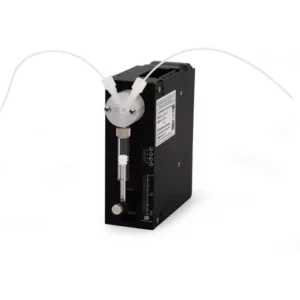Industrial syringe pumps are commonly used for precise and controlled fluid dosing or metering in various industrial applications. These pumps are designed to accommodate syringes of different sizes and can provide highly accurate and repeatable fluid delivery.
Here are some common uses of industrial syringe pumps include:
- Chemical and Pharmaceutical Manufacturing: Industrial syringe pumps are employed in chemical and pharmaceutical manufacturing processes. They are used for precise addition of reagents, catalysts, additives, or other chemicals into reaction vessels or mixing systems. The pumps offer accurate and controlled dosing, ensuring consistent product quality and minimizing waste.
- Biotechnology and Life Sciences: Syringe pumps find extensive use in biotechnology and life science applications. They are utilized for controlled dispensing of biomaterials, enzymes, culture media, and other fluids in laboratory research, cell culture, bioprocessing, and drug discovery processes. The precise fluid delivery provided by syringe pumps is crucial for maintaining optimal conditions and achieving reproducible results.
- Analytical Instrumentation: Syringe pumps are commonly integrated into analytical instruments such as liquid chromatography (LC), gas chromatography (GC), and spectrophotometers. They are used for sample and solvent delivery, ensuring accurate and consistent flow rates for reliable analysis. Syringe pumps enable precise injection volumes, enhancing the accuracy of measurements and improving analytical performance.
- Fluid Testing and Calibration: Industrial syringe pumps are employed in fluid testing and calibration processes. They can be used to deliver precise volumes of fluids for testing purposes, such as calibrating sensors, validating equipment performance, or verifying the accuracy of measurement devices.
- Printing and Coating Applications: Syringe pumps find use in printing and coating applications that require precise fluid deposition. They are used to dispense inks, adhesives, coatings, or other fluids onto substrates with high accuracy and repeatability. Syringe pumps enable controlled flow rates and precise control over the amount of fluid dispensed, ensuring consistent and uniform coatings or prints.
- Microfluidics and Lab-on-a-Chip Systems: Syringe pumps are integrated into microfluidic devices and lab-on-a-chip systems for precise control of fluid flow. They are used to deliver fluids at specific rates and volumes in microscale analysis, microreactors, and other microfluidic experiments. Syringe pumps enable researchers to precisely control the flow dynamics and manipulate fluids in microfluidic channels.
- Industrial Automation and Process Control: Syringe pumps find applications in industrial automation and process control systems. They can be used for fluid dispensing, mixing, or metering in various manufacturing processes, such as electronics assembly, semiconductor manufacturing, or quality control operations. Syringe pumps enable precise and controlled fluid handling in automated systems, ensuring accurate and consistent production.
Overall, industrial syringe pumps are versatile tools for precise fluid dosing or metering in a wide range of industrial applications. They offer high accuracy, repeatability, and control, industrial syringe pump making them essential for processes that require precise fluid volumes, controlled flow rates, and reliable performance.
Here’s some additional information about industrial syringe pumps:
- High-Pressure and High-Viscosity Fluids: Industrial syringe pumps are capable of handling high-pressure fluids, making them suitable for applications requiring precise dosing of high-viscosity fluids or materials. They can effectively dispense adhesives, sealants, greases, pastes, or other viscous substances with ease and accuracy.
- Multi-Syringe Systems: Some industrial syringe pumps are designed to accommodate multiple syringes simultaneously. These multi-syringe systems allow for simultaneous or sequential fluid delivery from multiple syringes, enabling more complex dosing or mixing operations. They find use in applications that require precise ratios of multiple fluids or the mixing of multiple components.
- Programmability and Automation: Many industrial syringe pumps offer programmability and automation capabilities. They can be connected to computer systems or integrated into automated processes, allowing for precise control and synchronization with other equipment. Programmable features may include customizable flow profiles, ramping, pulsing, or complex dosing sequences, enhancing process control and flexibility.
- Feedback and Monitoring: Advanced industrial syringe pumps often incorporate feedback mechanisms and monitoring capabilities. These features allow for real-time monitoring and control of fluid dispensing parameters, such as flow rate, volume, pressure, or force. Feedback systems ensure accurate and consistent dosing by adjusting pump parameters based on actual fluid delivery conditions.
- Cleanroom Compatibility: Some industrial syringe pumps are designed to meet cleanroom requirements. They are constructed using materials and finishes that minimize particulate generation and are compatible with cleanroom environments. These pumps find use in industries such as semiconductor manufacturing, electronics assembly, or pharmaceutical production, where cleanliness and contamination control are critical.
- Integration with Process Control Systems: Industrial syringe pumps can be seamlessly integrated with process control systems, such as supervisory control and data acquisition (SCADA) or distributed control systems (DCS). Integration allows for centralized control, monitoring, and data logging, enabling efficient process management and documentation.
- Customization and Adaptability: Industrial syringe pumps can often be customized or adapted to specific application requirements. They may offer options for interchangeable syringe sizes, different types of syringe barrels (e.g., glass or plastic), and various sealing materials to accommodate a wide range of fluids and materials. Customization ensures optimal performance and compatibility with the specific needs of the application.
- Maintenance and Serviceability: Industrial syringe pumps are designed for easy maintenance and serviceability. They typically have user-friendly interfaces, quick-change mechanisms for syringe replacement, and easy-to-access components for cleaning, calibration, or repair. These features minimize downtime, simplify maintenance procedures, and ensure reliable operation over extended periods.
Industrial syringe pumps are versatile tools that provide precise and controlled fluid dosing in various industrial applications. Their ability to handle high-pressure fluids, compatibility with high-viscosity materials, programmability, and integration with automation systems make them valuable assets for industries that require accurate and reliable fluid dispensing and metering.
